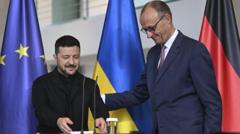In a significant diplomatic shift, German Chancellor Friedrich Merz has promised to support Ukraine in producing long-range missiles, a commitment that marks a more assertive approach than his predecessor and aims to bolster Ukraine's defense against ongoing Russian aggression.
German Chancellor Pledges Support for Ukraine's Long-Range Missile Production

German Chancellor Pledges Support for Ukraine's Long-Range Missile Production
Germany's Friedrich Merz commits to aiding Ukraine in missile development amid rising tensions with Russia.
Germany's new chancellor, Friedrich Merz, greeted Ukraine’s President Volodymyr Zelensky in Berlin, where he assured continued support for Kyiv, focusing on missile production to strengthen Ukraine's defense against Russia. Rather than publicly confirming supplies of Taurus missiles, he stated that the specifics of this collaboration would remain confidential, indicating a strategic shift in Germany's military stance.
Merz, who took office earlier this month, has emphasized Germany's commitment to aid Ukraine with fewer restrictions on arms, indicating that the decision to lift range limits had been made several months earlier by Western allies. The Taurus missile, which has a range of 500km (310 miles), would enhance Ukraine's capability to strike deeper into Russian territory if supplied.
Although the Kremlin has denounced the potential easing of range restrictions as dangerous and unhelpful to peace efforts, Merz's assertiveness represents a departure from the more cautious approach of former Chancellor Olaf Scholz. He confirmed that a formal agreement between the defense ministers of Germany and Ukraine for long-range missile production would be signed imminently.
Amid these developments, Zelensky has reiterated the call for peace talks aimed at settling the ongoing conflict, expressing openness to a trilateral discussion format involving himself and leaders like Trump and Putin. The Kremlin, on its part, acknowledged readiness for another round of talks but highlighted the need for concrete agreements before such discussions could proceed.
Russian officials have stated that they will present a memorandum outlining their peace terms in the forthcoming talks, while Ukraine remains firm that any future negotiations must yield tangible outcomes. Zelensky also accused Russia of stalling the peace process, reflecting frustrations after recent discussions resulted in limited progress, such as an agreed prisoner exchange.
As humanitarian concerns escalate, with continued aerial attacks and troop mobilizations reported, the situation on the ground remains dire. Ukraine's military faced one of its most extensive drone operations against Russian positions, while intensifying clashes occur in northeastern regions, where Moscow is reportedly amassing troops.
The ongoing war, which has dragged on into its fourth year, continues to take a significant human toll, with countless lives lost and substantial portions of Ukraine left devastated.
Merz, who took office earlier this month, has emphasized Germany's commitment to aid Ukraine with fewer restrictions on arms, indicating that the decision to lift range limits had been made several months earlier by Western allies. The Taurus missile, which has a range of 500km (310 miles), would enhance Ukraine's capability to strike deeper into Russian territory if supplied.
Although the Kremlin has denounced the potential easing of range restrictions as dangerous and unhelpful to peace efforts, Merz's assertiveness represents a departure from the more cautious approach of former Chancellor Olaf Scholz. He confirmed that a formal agreement between the defense ministers of Germany and Ukraine for long-range missile production would be signed imminently.
Amid these developments, Zelensky has reiterated the call for peace talks aimed at settling the ongoing conflict, expressing openness to a trilateral discussion format involving himself and leaders like Trump and Putin. The Kremlin, on its part, acknowledged readiness for another round of talks but highlighted the need for concrete agreements before such discussions could proceed.
Russian officials have stated that they will present a memorandum outlining their peace terms in the forthcoming talks, while Ukraine remains firm that any future negotiations must yield tangible outcomes. Zelensky also accused Russia of stalling the peace process, reflecting frustrations after recent discussions resulted in limited progress, such as an agreed prisoner exchange.
As humanitarian concerns escalate, with continued aerial attacks and troop mobilizations reported, the situation on the ground remains dire. Ukraine's military faced one of its most extensive drone operations against Russian positions, while intensifying clashes occur in northeastern regions, where Moscow is reportedly amassing troops.
The ongoing war, which has dragged on into its fourth year, continues to take a significant human toll, with countless lives lost and substantial portions of Ukraine left devastated.























